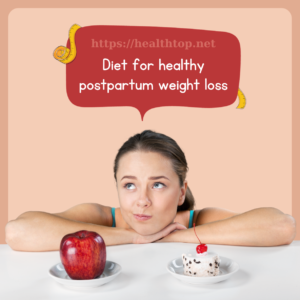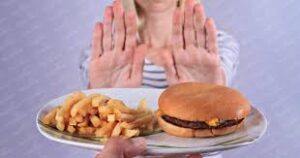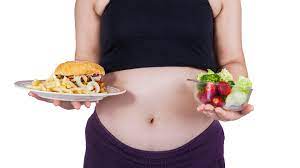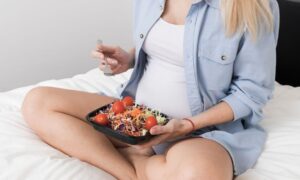Diet for healthy postpartum weight loss you need to know
Diet for healthy postpartum weight loss
Getting back in shape after giving birth is the desire of many mothers. The following are tips on postpartum diet to help women succeed and feel comfortable throughout their postpartum weight loss journey.

For healthy postpartum weight loss, focus on a balanced diet rich in whole foods. Prioritize lean proteins, such as poultry and fish, along with fiber from fruits, vegetables, and whole grains. Stay hydrated with plenty of water to support metabolism. Incorporate healthy fats from sources like avocados and nuts. Small, frequent meals help control hunger and stabilize blood sugar levels. Limit processed foods, sugary snacks, and high-calorie beverages. Combine a nutrient-dense diet with gradual, safe exercise, consulting with healthcare professionals for personalized guidance. Emphasize self-care, adequate sleep, and patience, ensuring a holistic approach to postpartum health and weight management.
- Don’t start dieting too early
Your body needs time to recover after labor and birth. Give yourself complete rest until your health check-up 6 weeks after giving birth. If your doctor gives the go-ahead, you can start tracking your calorie intake and actively lose weight after giving birth. For women who are breastfeeding, experts recommend waiting until the baby is at least 2 months old before trying to lose weight.

Starting a diet too soon after giving birth can slow your recovery and make you feel more tired. Meanwhile, new mothers need a lot of energy to adapt to life with a newborn. Additionally, if you are breastfeeding, your postpartum diet can affect your milk supply. Be patient and give your body time to stabilize, you will be surprised at how naturally you lose weight, especially if you breastfeed.
- Have a realistic view of postpartum weight loss
Remember that it is very difficult to return to your exact pre-pregnancy weight or shape. For many women, pregnancy causes permanent changes. Their stomachs will be softer, their hips a bit wider, and their waists larger. Therefore, you should adjust your goals to be as close to reality as possible, avoiding putting pressure on yourself.
- Focus on exercise
There is no magic pill to help you lose postpartum weight effectively and safely. A healthy diet combined with regular exercise to lose weight. The important thing to remember when working out is that you should be trying to lose fat instead of muscle. When your body is ready, start by eating less and being more active – for example, take your baby for a walk around the block.
- Lose weight slowly
Do not diet too strict and strict. Normal women need at least 1,200 calories a day to stay healthy, and postpartum mothers need 1,500 – 2,200 calories a day to ensure they have enough energy, as well as avoid mood swings. If you’re breastfeeding, you need a minimum of 1,800 calories and an average of 2,000 – 2,700 calories per day to nourish both yourself and your baby.

Losing weight too quickly after giving birth can reduce your milk supply and release toxins stored in fat into your blood and milk. Toxins can include heavy metals such as lead and mercury, dioxins, and solvents…
Losing about 0.7 kg per week is safe and will not affect your milk supply. To achieve this, each day cut 500 calories from your current menu by consuming less food or increasing your activity level.
- Eat well and on time
When you have to take care of a newborn baby and adapt to new habits, it can be difficult to eat on time. Many mothers say that eating 5-6 small healthy meals a day instead of 3 main meals will suit their appetite and save more time. A small meal might include 1 slice of sandwich, some carrots, fruit and 1 glass of milk.

The reality is that skipping meals will only make you tired and not help you lose weight, because you will eat more at other meals. Skipping meals can also make you feel tired and irritable. Even if you don’t like to eat breakfast, you still have to remember that breakfast helps you not feel hungry and tired when lunchtime approaches, and also provides you with energy to be more active. Additionally, many studies show that skipping breakfast can sabotage your postpartum weight loss efforts. According to statistics, 78% of people who successfully lose weight eat breakfast every day.
You should also eat slowly if possible. When you take the time to pay attention to your meals, you’ll have an easier time knowing when you feel full and are less likely to overeat.
What do you know about weight loss pills?
Diet for healthy postpartum weight loss
Getting back in shape after giving birth is the desire of many mothers. The following are tips on postpartum diet to help women succeed and feel comfortable throughout their postpartum weight loss journey.
The following postpartum diet for weight loss adds up to 2,200 calories per day for breastfeeding mothers, and an additional 1,800 calories per day for women who do not breastfeed. However, each person’s individual calorie needs will vary depending on weight, metabolism and activity level, as well as the level of breastfeeding.
Here are some suggestions for you to eat more fruits and vegetables:
Make a fruit or vegetable smoothie
Use fruit or vegetable sauce with fish or chicken
Add shredded carrots to the sandwich
Try grilled vegetables
Use cooked vegetable soup.
Fat has twice as many calories as carbohydrates or protein, so cutting excess fat from your diet is the easiest way to cut calories. Choose low-fat or fat-free dairy products, bake foods instead of stir-fry, and limit your intake of sweets, which contain a lot of calories from sugar and fat.
Keto diet what you need to know
However, fat is still an important nutritional component and should not be completely eliminated from the postpartum diet. In fact, consuming some fat with meals will help you feel full longer and not take in too many carbohydrates. The trick is to choose “good” fats over “bad” fats. Good fats are monounsaturated and polyunsaturated fats, found in canola oil, olive oil, avocados, nuts and fatty fish (salmon).


Pingback: What do you know about weight loss pills? - Healthtop.net
Pingback: What are the effects of fruit weight loss smoothies?
Great content! Super high-quality! Keep it up!
Thank you for your help and this post. It’s been great.
Thank you for your post. I really enjoyed reading it, especially because it addressed my issue. It helped me a lot and I hope it will also help others.
Thank you for your articles. I find them very helpful. Could you help me with something?
Great beat ! I would like to apprentice while you amend your web site, how could i subscribe for a blog site? The account helped me a acceptable deal. I had been a little bit acquainted of this your broadcast provided bright clear concept
Thanks for posting. I really enjoyed reading it, especially because it addressed my problem. It helped me a lot and I hope it will help others too.
Thank you for being of assistance to me. I really loved this article.
Your articles are extremely helpful to me. Please provide more information!
You’ve the most impressive websites.